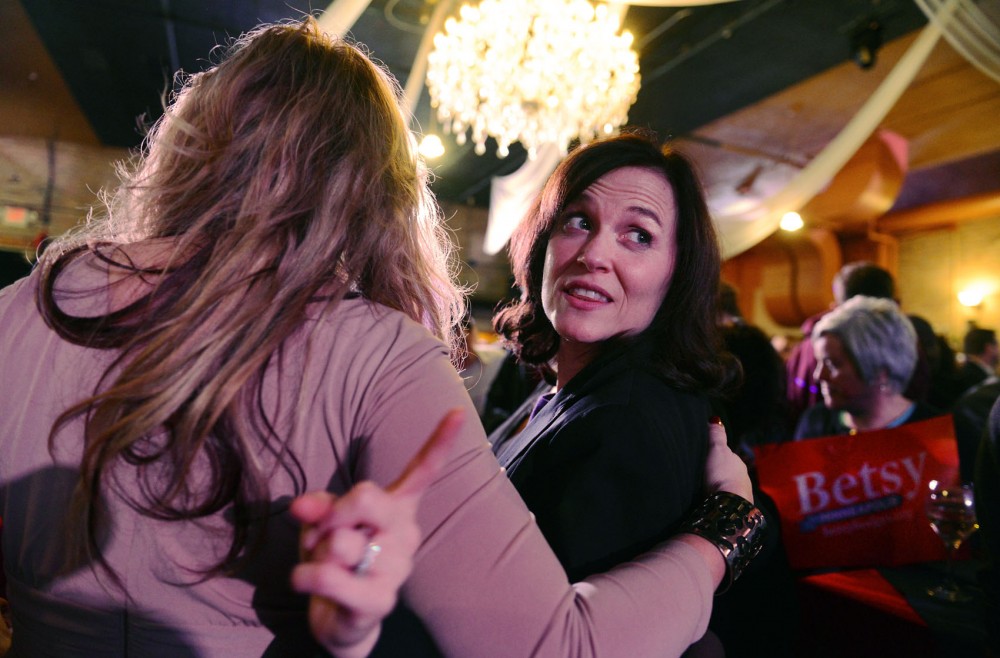The next mayor of Minneapolis had not been officially decided as of Tuesday night, but City Councilwoman Betsy Hodges had about 36.5 percent of first-choice votes — enough to force her closest rival to admit defeat.
Mark Andrew unofficially conceded in a speech Tuesday night after winning nearly 25 percent of first-choice votes, trailing Hodges in second place. Don Samuels, in third, received about 10.5 percent of the first-choice votes.
“Welcome to ranked-choice voting, Minneapolis. There is a lot we do not know right now. We do not know who the next mayor of Minneapolis is,” Hodges said in a speech to supporters Tuesday night.
The three DFL members ran against 32 other hopefuls in the first open Minneapolis mayoral race using a ranked-choice voting system in which voters list their top three preferences.
Because none of the candidates won more than half the first-choice votes, election officials will continue counting ballots Wednesday, starting with second-choice votes.
Each round of counting eliminates the least-popular candidates. If a voter’s first choice is eliminated, their vote goes to their second choice. Whichever candidate receives the majority of the votes casted will succeed current Mayor R.T. Rybak.
Until second- and third-choice votes are tallied, Andrew can’t formally concede. Results for the mayoral election are expected Wednesday night.
Andrew bids farewell
At his election party Tuesday night, Andrew told supporters that clawing his way back into the race seemed almost impossible.
The former Hennepin County Commissioner and University of Minnesota alumnus’ campaign fundraising efforts walloped his opponents’. Andrew had raised about $420,000 by the end of October, compared to about $285,000 for Hodges, the only other candidate to crack $200,000.
In a speech Tuesday night, he said he supports Hodges and doesn’t hold anything against her.
Since entering the race in February, Andrew secured a number of high-profile endorsements and came closer than any other candidate to securing the Minneapolis DFL endorsement at a convention in June.
Andrew said his campaign, which focused on improving transit, closing the achievement gap and expanding the city’s environmental efforts, attracted many young voters.
Marketing senior Moriah Greenblat said she voted for Andrew because he was the most visible candidate.
Greenblat praised Andrew’s focus on younger voters and said he took college students seriously rather than writing them off.
Augsburg College freshman Jaelyn Arndt said she only marked Andrew on her ballot because she didn’t know of any other candidates and she likes his ideas to improve the city’s bike trails and recycling program.
Arndt voted at the polling place positioned at Augsburg, where 147 people had cast their ballots by mid-morning Tuesday.
Ranked-choice voting
Some voters said they preferred ranked-choice voting over traditional methods because the system gave them more choices in a crowded field of candidates.
Cam Winton, who ran as an independent, received nearly 9.5 percent of the first-round votes, just behind Ward 5 City Councilman Don Samuels.
Samuels said his strategy depended on the ranked-choice voting system, but he doesn’t know if he can make up Hodges’ lead.
“It certainly is going to be tough,” he said.
Political science junior Drew Christensen said he supported Winton because “he’s not a political insider; he’s a fresh set of eyes.”
“It’s been an amazing campaign, bringing people together from across the political spectrum,” Winton said.
Theater senior Grace Christenson said she likes ranked-choice voting because it allows citizens to throw their vote behind a less-popular candidate while still supporting a major one.
Hodges leads polls
Hodges’ hold on the lead surprised some who expected fiercer competition in a race with almost three dozen candidates and about $1 million in campaign contributions.
“The fact that Hodges has as big a lead as she does is really surprising. I thought this was going to be tighter,” said David Shultz, a Hamline University law professor.
Sen. Scott Dibble, DFL-Minneapolis, co-chair for Hodges’ campaign committee, said he’s supported Hodges for a long time.
“She really brings a progressive vision for change to address disparities and gaps and lack of access to opportunities,” he said. “And at the same time, being really hard-nosed and doing what needed to be done to bring the city back to good fiscal and financial footing.”
Before her City Council term, Hodges worked as a fundraiser for the Minnesota Justice Foundation.
“She seemed like a progressive candidate who’s going to be a good fit,” biomedical engineering junior Connor Nolan said.
Ward 3 resident Max Donsker said he voted for Hodges because “she’ll take a more active role in the city’s development.”
Donsker voted at the polling place stationed at First Congregational Church of Minnesota, where about 90 people had voted by mid-morning.
Charleen Bacigulpo, a Hodges supporter from Ward 7, said one wouldn’t expect Hodges to dominate in such an open field.
Hodges thanked nearly 300 supporters Tuesday for their help in garnering votes during the final days of her campaign.
“Here’s to today, Minneapolis, and I look forward to seeing you tomorrow.”
Alma Pronove, Nathaniel Rabuzzi, Cody Nelson and Holly Peterson contributed to this report.








